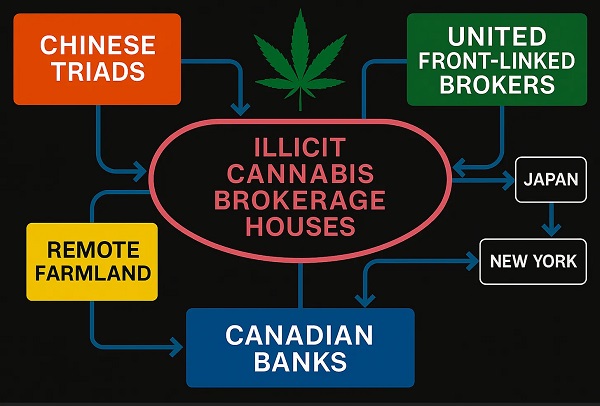Crime
How the CCP’s United Front Turned Canada’s Legal Cannabis Market into a Global Narcotics Brokerage Network

Short-term rentals. Legal weed. Illegal exports. United Front agents built a decentralized drug trafficking network—using Canadian land and export markets to fuel China’s narco-financial machine.
VANCOUVER, Canada — Around the time Canadian police uncovered a massive Chinese drug cash bank in Richmond, B.C.—exposing the so-called Vancouver Model of transnational money laundering—investigators made another stunning discovery that has never before been publicly disclosed.
According to sources with direct knowledge, operatives tied to Beijing’s foreign influence arm, the United Front Work Department, were orchestrating a parallel cannabis trafficking and money laundering operation—leveraging Canada’s legalization of marijuana to export the lucrative commodity to the United States and Japan. The scheme used short-term rental platforms to operate illicit cannabis brokerage houses in Vancouver, aggregating product from vast acreages across Western Canada and shipping it to destinations including Tokyo and New York City. Proceeds were collected in United Front-linked drug cash brokerages in those cities and laundered back through Canadian banks.
As previously reported by The Bureau, the RCMP has observed a two-decade-long consolidation of legal cannabis licenses in British Columbia by Chinese state-linked mafia networks. These groups have exploited illegal migrant labor from Asia—often housed in suburban townhomes and single-family grow-ops across Vancouver—to power what amounts to a parallel, state-enabled narco economy.
But as real estate prices in Metro Vancouver soared—driven in part by drug capital—RCMP investigators noticed Chinese triads strategically selling off high-priced grow-op properties to avoid scrutiny and reinvesting profits in remote farmland across B.C., including in Oliver, Prince George, and the Okanagan Valley.
These rural acreages became production zones. Asian organized crime groups transported cannabis to centralized brokerage houses, where senior Sam Gor figures and affiliated United Front community leaders established hubs for transnational shipment, trafficking, and laundering. The system—structured like a decentralized factory—was engineered to distribute risk and rapidly shift locations.
“They transport it down, and then we started seeing the rise of these brokerage houses again, with United Front control and Asian organized crime links,” a Canadian intelligence source told The Bureau. “New York is a favourite destination. The weed goes out in a variety of routes, the money comes back to be laundered. The process is repeated.”
In the case that triggered the discovery, an RCMP informant observed a steady stream of individuals entering a Vancouver-area home with black garbage bags, heading into the garage, and emerging minutes later with duffel bags of unknown contents. To detectives from E-Pirate—Canada’s largest-ever casino money laundering investigation—the duffel bags looked strikingly familiar.
This was the same method used by Chinese high-rollers supplied through a Sam Gor-linked cash brokerage in Richmond. In that case, associates of Paul King Jin and Jian Jun Zhu received large cash deposits at a bulletproof-glass storefront called Silver International—funds delivered by drug traffickers from across Western Canada. Couriers from Alberta and B.C. drove proceeds into Richmond, dropped off suitcases of cash, and each transaction was meticulously recorded in paper ledgers. Sam Gor would then transfer the equivalent funds into Chinese bank accounts—often linked to fentanyl production.
The warehoused cash at Silver International was also loaned to Chinese gamblers, with Paul Jin himself frequently delivering bundles to parking lots outside River Rock Casino in Richmond, as well as to other government-run casinos in Burnaby and surrounding suburbs. The funds were laundered through B.C.’s provincially regulated gaming system. This was the Vancouver Model. Chinese high-rollers provided liquidity to the system by depositing funds into United Front-linked bank accounts in China, then receiving their payouts in Richmond—delivered in duffel bags of cash.
The discovery of cannabis collector sites near these casinos resembled the other side of the pipeline—this time focused on cannabis rather than cocaine, fentanyl, or methamphetamine—a ‘legal’ narcotics trade now dominated across North America by Chinese organized crime networks operating in tandem with CCP-linked regional officials, according to former DEA Special Operations Division leader Don Im.
In this operation, RCMP investigators recorded license plates of drivers arriving at the suspected brokerage house. They matched many of them to vehicles also seen at Paul Jin’s Richmond boxing gym—an establishment tied to the highest levels of Sam Gor and UFWD figures in Vancouver.
“It was just phenomenal,” a Canadian intelligence source said. “And all of it links back, ultimately, to the exact family and community of people that we’ve talked about for years. You’d see a girlfriend—the girlfriend’s car of some well-known guy that goes to Paul Jin’s gym—would be showing up at this place for five minutes, would drive away, and then somebody else’s car which was associated to this guy’s girlfriend.”
In one RCMP raid on a brokerage house, investigators seized not only cannabis, but packaging materials and branded labels imported from Asia via commercial carriers—designed for a recognizable brand of cannabis sold online.
“What these guys were doing,” the source disclosed, “was securing rental houses through VRBO or other short-term platforms—one, two, three months at a time—and using them as brokerage houses. Then they’d move to another location. And they would bring in labor from overseas.”
That labor, often undocumented immigrants from China and Vietnam, was found living in squalid, makeshift conditions.
“Mattresses on the floor,” the source said. “This is where we get into the CBSA piece—where they found people at these locations who were overstays, undocumented, all the rest of it—and they would boot them out.”
The level of sophistication in these narcotics brokerage operations—essentially the mirror image of Chinese cash collection hubs uncovered by DEA agents in the United States—stunned RCMP intelligence officials.
They noted unintended consequences stemming from cannabis legalization under Prime Minister Justin Trudeau’s Liberal government in 2018.
“Since legalization, Asian organized crime has emerged as the dominant force behind cannabis in Canada. Product from grow ops in the interior of B.C. gets consolidated at a variety of VRBO and short-term rental houses in the Lower Mainland,” one source texted to The Bureau. “Brokers bid on product and provide packaging services for online sales.”
“In one case, the brokerage house was in the east end of Vancouver,” the source, who could not be named, said. “It was equipped with a cryptocurrency ATM. Come in, pay by Bitcoin, leave with your weed.”
The discovery of these covert brokerages prompted RCMP transnational crime investigators to dig deeper.
“And that led to a couple of other investigations,” the source said. “And that led to marijuana that we knew was getting shipped to New York State. They really liked B.C. Bud.”
According to the source, the cannabis was often transported overland across Canada in commercial vehicles, hidden inside consumer goods.
“We found evidence of water coolers and stuff like that, or on-demand water heater systems—gutted and repurposed just to move the product. They’d drive it across the country with this stuff packed inside.”
And Sam Gor operatives transported Canada’s “legal” weed through Ontario and across the border into the United States.
“They would get it over into New York State,” the source said. “And then we actually—years previous to this—we did a money laundering file where we were receiving back the money from those proceeds, coming back through the United States from New York. So it showed you a full circle of it.”

Meanwhile, a source added that a small island in the Fraser River, near River Rock Casino, has drawn law enforcement attention due to warehouses allegedly controlled by Sam Gor associates and underground bankers connected to the Silver International case and United Front networks.
“There’s a whole series of warehouses there that are of extreme interest to CBSA and to us,” a source said, explaining that consumer goods from across Western Canada are exported from the location, with narcotics secreted inside, and product labels altered to evade international customs scrutiny.
“What they did is they secreted—they would cut open the bags and they’d put marijuana inside those bags, and then they were going to export to Japan,” the source said. “So that’s the kind of thing that we’re seeing going on here as well—these brokerage facilities are multipurpose. Some of the product is also moved to other locations where they’re actually altering packaging and everything else to head off detection.”
“That use of brokerage houses—just moving it around—is extremely common now,” the source added. “In fact, that’s been known for years—even over in Australia.” Describing a typical “shore party” tactic, the source said:
“They’ll send a local guy from Vancouver down to Sydney. He’ll stay in a VRBO at Bondi Beach. While he’s there, a UPS package arrives. He takes it to a drop point, gets paid, spends a few days on the beach, and flies home. From the AFP’s perspective, they find that, obviously, quite difficult too.”
Asked whether these Sam Gor and United Front-linked cannabis trafficking and money laundering networks were also dealing in fentanyl, one source responded bluntly:
“No doubt. When you are in one aspect of the biz, what’s the disincentive not to be in fentanyl too? Or wine, or cigarettes.”
Former DEA Special Operations Division leader Don Im, a veteran expert on China’s transnational narcotics and money laundering architecture, reviewed the evidence cited in this story for The Bureau. Decades ago, as a young agent in New York City, Im said he witnessed the early evolution of Triad-linked money laundering networks—surveilling Colombian heroin traffickers forging connections in Chinatown.
Prior to his retirement in 2022, Im said he had direct visibility into how Chinese Communist Party-linked drug barons—operating through Sam Gor and allied Triad syndicates—seized control of cannabis cultivation across much of the world. These networks, he explained, have repurposed the same smuggling corridors, laundering systems, and brokerage house infrastructure to traffic a range of narcotics, from synthetic opioids to methamphetamine.
“This playbook was being mirrored throughout the U.S., Canada, Europe,” Im said of the cannabis brokerage system described in this story.
“The Chinese have become the dominant cultivators of marijuana in North America, in my opinion. They’re doing it in Europe, too. Why? Because it’s legal in most places—with little to no risk of imprisonment. So they’re generating literally tens of billions from marijuana alone.”
Im said U.S. law enforcement began noticing the pattern around the same time Canadian police observed Triads consolidating medicinal marijuana licenses in British Columbia.
“We started seeing it in the mid-2000s—Chinese workers coming into indoor grows, especially in Colorado,” he said. “At first, we thought it was an anomaly. But it wasn’t.”
“Now, China holds an annual hemp trade fair because they’re trying to corner the global hemp industry. They bring in thousands of companies and individuals to expand the global marijuana market.”
According to Im, Chinese Communist Party officials—particularly in provincial governments—view global decriminalization trends as a strategic opening to dominate transnational black markets with minimal legal risk.
“The global drug markets have become the ad hoc bank not just for Chinese citizens seeking to move capital abroad—but for CCP officials, provincial governors, and state-owned enterprises,” Im said. “They use drug proceeds to pay off massive debts, fund capital projects, finance Belt and Road operations, and carry out influence campaigns. It’s a cycle.”
“People think, ‘Oh, marijuana is a benign drug.’ Okay? It’s still a drug. And the value it generates—the profit—is massive,” Im continued. “Even on a conservative estimate, we’re talking half a trillion to three-quarters of a trillion dollars annually. That’s off the streets and across the world—not just Europe and North America.”
“People think I’m crazy when I say it generates that much,” he added. “But the RAND Corporation and the U.N.—they track the value of heroin, cocaine, methamphetamine, fentanyl, ecstasy, and marijuana. That’s the number.”

Recommend The Bureau to your readers
Courageous Discourse
No Exit Wound – EITHER there was a very public “miracle” OR Charlie Kirk’s murder is not as it appears

By John Leake
Turning Point Spokesman: “No Exit Wound a Miracle”
Charlie Kirk Show producer Andrew Kolvet repeats extremely dubious claim purportedly made by “the surgeon who operated on Kirk.”
Monday Blaze Media (relatable with Allie Beth Stuckey) reported the following:
Turning Point USA spokesman and executive producer of the “Charlie Kirk Show” Andrew Kolvet revealed new details about the shooting that even doctors are calling a miracle. According to Kolvet, the surgeon who operated on Kirk claimed that the high-velocity bullet was powerful enough to kill multiple large animals — and “should have gone through” his body. But for some reason, Kirk’s body was able to stop it.
“I want to address some of the discussion about the lack of an exit wound with Charlie,” Kolvet wrote in a post on X.
“The fact that there wasn’t an exit wound is probably another miracle, and I want people to know,” Kolvet continued, explaining that he had spoken with the surgeon who worked on Charlie in the hospital.
“He said the bullet ‘absolutely should have gone through, which is very very normal for a high powered, high velocity round. I’ve seen wounds from this caliber many times and they always just go through everything. This would have taken a moose or two down, an elk, etc,’” he recalled.
“But it didn’t go through. Charlie’s body stopped it,” he added.
When he mentioned to the doctor that there were “dozens of staff, students, and special guests standing directly behind Charlie” when he was shot, the doctor reportedly replied, “It was an absolute miracle that someone else didn’t get killed.”
“His bone was so healthy and the density was so so impressive that he’s like the man of steel,” Kolvet recalls the doctor saying.
This is not a credible statement, and it raises a number of concerns.
It strikes me as very perplexing that a “surgeon operated on Kirk,” because in the video of the shooting, Charlie reacted with a decorticate posture—that is, an abnormal body posture characterized by flexion of the upper limbs—caused by severe trauma to the central nervous system. This indicates that the bullet either directly struck his cervical spinal cord, or the shock wave of the supersonic bullet passing near his spinal cord traumatized it.
A 150-grain, .30-06 bullet’s energy at 150 yards from the muzzle varies by ammunition, but a common hunting cartridge has an estimated value of approximately 1,800-2,000 foot-pounds (with the bullet traveling at about 2500 feet per second). In other words, the .30 caliber (.30 inch diameter) metal projectile struck his neck with sufficient kinetic energy to move a 2,000 pound mass a linear distance of one foot.
If the bullet that struck Charlie’s cervical spinal cord was a .30-06 fired from 150 yards away, it would have:
1). Severed his spinal cord, killing him instantly.
2). Passed through his neck.
Note that the cervical vertebrae are supported by strong muscles and have high compressive strength, but are far too delicate to stop a .30-06 bullet traveling at 2,500 feet per second.
If ALL of the kinetic energy of the bullet was absorbed by Charlie’s neck, it would have done spectacular trauma to his neck, as distinct from producing the clean bullet hole visible in the video footage that ruptured his Carotid artery.
Though I appreciate that some may find a supernatural explanation to be consoling, it seems to me that the investigation should not rest on the this explanation.
As I wrote a few weeks ago: If I were investigating the murder, I would consider the hypothesis that Charlie was shot with a weapon equipped with a suppressor and loaded with a subsonic cartridge to further reduce the sound. I have seen footage of someone firing a rifle with this setup, and the shot was amazingly quiet. The effective range of such a weapon is about 100 yards or less, and the shooter must be very skilled.
However, such a setup could fire a subsonic projectile that would penetrate a human neck without passing through it. In this scenario, the actual assassin (firing the suppressed rifle) hypothetically coordinated the timing of his shot with someone else firing a normal (supersonic and loud) rifle cartridge into the air at the same time to create a distraction or red herring.
In a functioning society in which the people trust their authorities—including their medical examiners—it would be easy to discover what happened and to disclose at least a preliminary report that would satisfy most reasonable people. The trouble our Republic is facing now is that so many of us no longer trust our federal and state authorities to tell us the truth.
For example, we have strong grounds for suspecting that medical examiners are not diligently investigating (with the proper analytic methods) unexpected, fatal cardiac arrests in young people to determine if they were caused by vaccine-induced myocarditis.
Subscribe to FOCAL POINTS (Courageous Discourse).
For the full experience, upgrade your subscription.
Business
Quebecers want feds to focus on illegal gun smuggling not gun confiscation

The Canadian Taxpayers Federation released new Leger polling showing that half of Quebecers say the most effective way to reduce gun crime is to crack down on illegal gun smuggling from the United States, not a federal gun ban and confiscation.
“Law enforcement experts say the best way to make Canada safer is to stop illegal gun smuggling and Quebecers say exactly the same thing,” said Nicolas Gagnon, CTF Quebec Director. “It makes no sense to pour hundreds of millions into a confiscation that only takes guns from lawfully licensed gun owners.”
In 2020, the federal government launched its policy to confiscate thousands of so-called “assault-style” firearms from licensed gun owners. Ottawa recently announced a pilot project in Cape Breton to start taking firearms from individual owners.
The Leger poll asked Quebecers what they think is the most effective way to reduce gun crime. Results of the poll show:
- 51 per cent say introducing tougher measures to stop the illegal smuggling of guns into Canada from the United States
- 37 per cent say banning the sale and ownership of many different makes and models of guns along with a government buyback program
- Six per cent say neither of these options
- Seven per cent do not know
The results of the polls arrived as recorded remarks from Public Safety Minister Gary Anandasangaree made headlines in September.
In a leaked audio recording, the minister suggested the confiscation program is being pushed in part because of voters in Quebec, while also expressing doubt that local police services have the resources to enforce it.
Police organizations have long warned Ottawa’s confiscation program is misguided. The RCMP union says it “diverts extremely important personnel, resources, and funding away from addressing the more immediate and growing threat of criminal use of illegal firearms.”
The program was first estimated to cost $200 million. Just providing compensation for the banned guns, not including administrative costs, could cost up to $756 million, according to the Parliamentary Budget Officer.
Premiers of Alberta and Saskatchewan have both publicly said that they would not cooperate with Ottawa’s gun ban. Premier François Legault has stayed silent on this issue.
“Quebecers have been clear: the real problem is illegal gun smuggling, not law-abiding firearms owners,” said Gagnon. “The police have also made it clear the gun confiscation will waste money that could be used to stop criminals from committing gun crimes.
“Legault needs to stand up for Quebec taxpayers and refuse to help implement Ottawa’s costly and ineffective confiscation scheme. The federal government needs to drop this plan and focus its resources on intercepting illegal guns at the border: that’s how you actually make communities safer.”
-

 Agriculture2 days ago
Agriculture2 days agoFrom Underdog to Top Broodmare
-

 Health2 days ago
Health2 days agoSovereignty at Stake: Why Parliament Must Review Treaties Before They’re Signed
-

 Business2 days ago
Business2 days ago$15B and No Guarantees? Stellantis Deal explained by former Conservative Shadow Minister of Innovation, Science and Technology
-

 RCMP2 days ago
RCMP2 days agoPolice arrest thieves using garage-door openers to access homes in Vanier, West Park, Anders Park, and Evergreen
-

 Bruce Dowbiggin2 days ago
Bruce Dowbiggin2 days agoWhile America Shrugs Off Woke, Canada Doubles Down On Feminizing Society
-

 Energy2 days ago
Energy2 days agoNational media energy attacks: Bureau chiefs or three major Canadian newspapers woefully misinformed about pipelines
-

 COVID-192 days ago
COVID-192 days agoCanadian veteran challenges conviction for guarding War Memorial during Freedom Convoy
-

 DEI1 day ago
DEI1 day agoConservative push to end Canada’s ‘anti-merit’ DEI programs receives support









